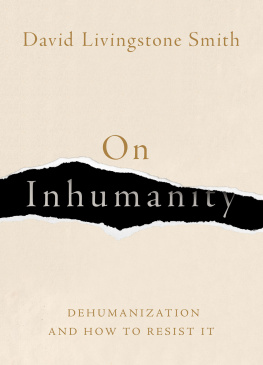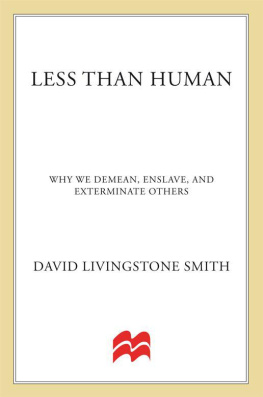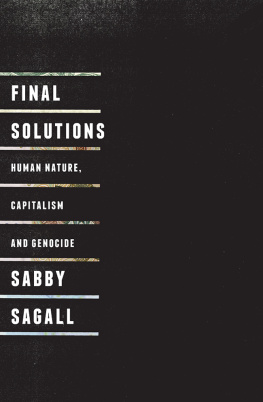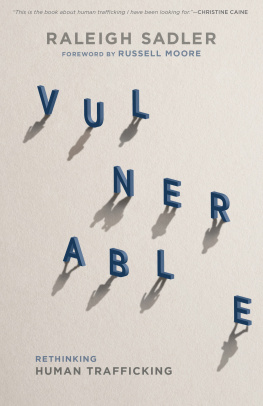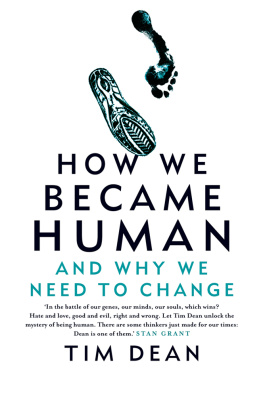ON INHUMANITY
Praise for On Inhumanity
On Inhumanity is a powerful exploration of the processes and consequences of dehumanization. Concerning himself with violence and the processes that motivate the extermination of lesser beings, Smith pens a much-needed treatment of the constantly reemerging brutality that is seemingly endemic to the human condition... Simply put, On Inhumanity is a most appropriate confrontation with the illusions and political powers that produce sub-humanity in the 21st century.Tommy J. Curry, University of Edinburgh, author of The Man-Not
On Inhumanity profoundly interrogates the processes that lead [or what leads] ordinary people to engage in horrific acts of violence against others. Tracing common themes across the Holocaust, lynching, and genocides, Smith identifies dehumanizationseeing human beings as subhuman creaturesas the central feature of these mass atrocities, as well as of everyday forms of racial oppression. Most compelling is that Smith refuses to conclude that dehumanization is our inevitable destiny and instead charts a course for resisting it. On Inhumanity brilliantly provides a chilling warning of repeating the past and a hopeful call to create a more humane future.Dorothy Roberts, University of Pennsylvania Carey Law School, author of Fatal Invention
A chilling, comprehensive, and passionate account of dehumanisation. Smith offers a devastating reminder of the capacity of every human to treat other humans as lesser.Angela Saini, journalist, author of Inferior and Superior

Oxford University Press is a department of the University of Oxford. It furthers the Universitys objective of excellence in research, scholarship, and education by publishing worldwide. Oxford is a registered trade mark of Oxford University Press in the UK and certain other countries.
Published in the United States of America by Oxford University Press
198 Madison Avenue, New York, NY 10016, United States of America.
Oxford University Press 2020
Epigraph from THE SOCIAL CONQUEST OF EARTH by Edward O. Wilson. Copyright 2012 by Edward O. Wilson. Used by permission of Liveright Publishing Corporation.
All rights reserved. No part of this publication may be reproduced, stored in a retrieval system, or transmitted, in any form or by any means, without the prior permission in writing of Oxford University Press, or as expressly permitted by law, by license, or under terms agreed with the appropriate reproduction rights organization. Inquiries concerning reproduction outside the scope of the above should be sent to the Rights Department, Oxford University Press, at the address above.
You must not circulate this work in any other form and you must impose this same condition on any acquirer.
Library of Congress Cataloging-in-Publication Data
Names: Smith, David Livingstone, 1953 author.
Title: On inhumanity : dehumanization and how to resist it /
David Livingstone Smith.
Description: New York, NY : Oxford University Press, 2020. |
Includes index.
Identifiers: LCCN 2019048933 (print) | LCCN 2019048934 (ebook) |
ISBN 9780190923006 (hb) | ISBN 9780190923020 (epub) | ISBN 9780190092566 (online)
Subjects: LCSH: HumanityPsychological aspects. |
Cruelty. | Hate. | Toleration.
Classification: LCC HM1131 .S653 2020 (print) | LCC HM1131 (ebook) |
DDC 179/.9dc23
LC record available at https://lccn.loc.gov/2019048933
LC ebook record available at https://lccn.loc.gov/2019048934
For Subrena, twenty-two years on.
Humanity is a magnificent but fragile achievement.
EDWARD O. WILSON
Contents
I want to thank Adam Hochman for his expertise, Sasha Smith and Abigail Erickson for the words to say things, Desire Melton and John Kaag for their unflagging encouragement, Darien Pollock for his street disposition, Rosa Pollock for her seal of approval, Mat Schlissler and Kayleigh Long for sharing their knowledge of Myanmar, Robin Dembroff for their expertise on gender, Lucy Randall for making the whole thing happen (and for her superb editing), and Subrena Smith for much more than I can ever put into words.
ON INHUMANITY
The Deep South at the tail end of the Jim Crow era was organized around the idea that Whites deserved power, privilege, and any resources they demanded, while anyone else, especially Blacks, were born to a life sentence of inferiority. This was the world in which I grew up. Raw racial oppression was all around. In public buildings and supermarkets, signs indicated White vs. Black water fountainsthose reserved for Whites clean and well-maintained, and those for Blacks dirty, rusty, and in disrepair. The local beacha beautiful one, on the Gulf of Mexicowas for Whites only, as was clear from the sign telling visitors that neither Negroes nor dogs were allowed. Our town was segregated, with Black people living in dire poverty in an area known as Dunbar Heights, far from the protected domain of White families. And I recall seeing crews of Black prisoners laboring by the roadside in the blistering Florida sun, under the eyes of armed White prison guards.
These common signs of a world built to privilege Whites and oppress Blacks did not just reflect what the government wanted or what the rules required. Most of the people who inhabited my worldthe White section of a sleepy southern townwere marinated from birth to death in the ideology that racial oppression is part of the natural order of things. And they enacted this ideology in their daily lives. The White children whom I played with, as well as their parents and grandparents, regarded Black people as subhuman. Sometimes this was explicit, as when boys I went to high school with boasted of hunting Black kids with their pellet guns on weekends. Mostly it was unspoken, but nevertheless as palpable and suffocating as the humid, heavy air.
My familys place in this racially riven world was more complicated than it may have seemed on the surface. My mother was the daughter of Jewish immigrantsor, I should say, refugeesfrom Eastern Europe, whose families looked to America as a safe haven from the pogroms. Her parents, Chaim, who was born in Belarus, and Bertha, who was born in Romania, were brilliant, self-educated people who had to quit school early: he to work in a Coca-Cola bottling plant, and sheat the age of fourteento work in a sweatshop on the Lower East Side of New York City (at the time, nicknamed The Ghetto). They visited us each summer.
Eventually, after my parents divorced, my grandparents left Brooklyn and moved down South to live with us. I grew up in their loving presence, and they taught me about the horrors of history. Some were family stories. There was the story of Chaims mother giving birth to him while hidden in a haystack while the Jews in her village were being raped and slaughtered. She was gagged, so she could not cry out in pain. And there was the story of Berthas mother, Rose, who fled anti-Semitic persecution to live deep in the Romanian forest with a group of Roma that took her in. I heard that she was once pushed off the sidewalk into the muddy gutter by a gentile soldier who snarled, Get off the sidewalk, Jew! (According to family legend, she looked him dead in the eye and cursed him: You will die before the sun sets!which, of course, in the reassuring family fable, he did.)

